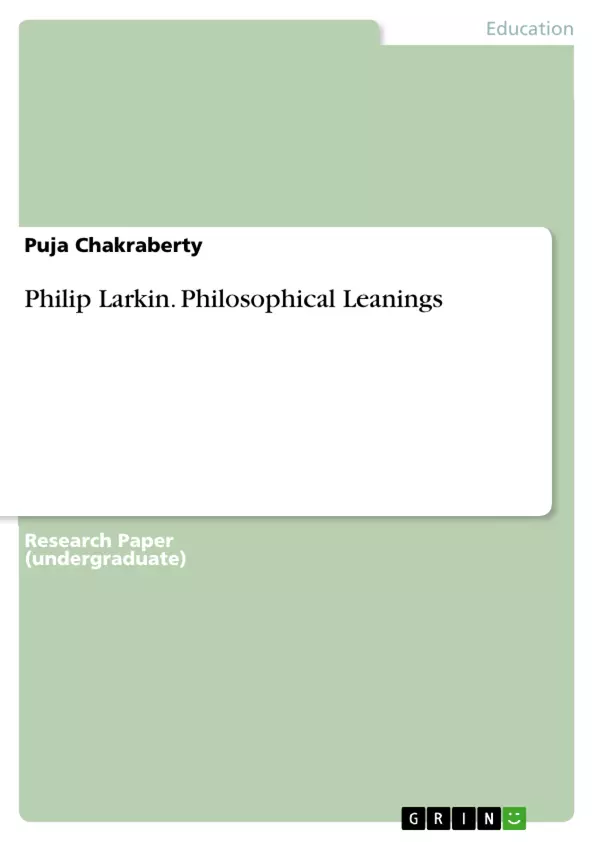This research aims to rework upon certain established and fundamental aspects of Larkin’s poetry, which not only define but also determine his elusive philosophical stance. Larkin appears to have had a close affinity with the distinguished German philosopher, Arthur Schopenhauer, the propounder of great systems of thought. Both Larkin and Schopenhauer seems to have been disillusioned by the frugal rewards of life and endeavoured to explore its subtleties.
Inhaltsverzeichnis (Table of Contents)
- INTRODUCTION
- THE MOVEMENT RECALLED: A MYSTERIOUS PHENOMENON
- SELF OR NO SELF
- THE SOCIAL ANIMAL: A SCRUTINY OF PHILIP LARKIN'S \"WANTS”
Zielsetzung und Themenschwerpunkte (Objectives and Key Themes)
This research examines certain established and fundamental aspects of Philip Larkin's poetry to define and determine his elusive philosophical stance. The study explores the influence of Arthur Schopenhauer's philosophy on Larkin's work and analyzes key themes related to the nature of self, societal interactions, and artistic expression.
- The influence of Schopenhauer's philosophy on Larkin's poetry.
- Larkin's views on the nature of self and the complexities of human existence.
- The relationship between art, society, and the individual.
- Larkin's exploration of themes related to sociability, unsociability, selfishness, and selflessness.
- The impact of external pressures on artistic creativity.
Zusammenfassung der Kapitel (Chapter Summaries)
- Chapter 1: INTRODUCTION This chapter introduces the work of Philip Larkin, focusing on his unique position in British literature and the diverse interpretations of his poetry. It establishes the objective of exploring Larkin's philosophical leanings and highlights the influence of Arthur Schopenhauer on his work.
- Chapter 2: THE MOVEMENT RECALLED: A MYSTERIOUS PHENOMENON This chapter delves into the nuances of Larkin's poetry and analyzes his philosophical perspectives through the lens of Schopenhauer's ideas. It examines the themes of society, the individual, and their intricate relationship, drawing parallels between Larkin's work and Schopenhauer's theories.
- Chapter 3: SELF OR NO SELF This chapter examines Larkin's exploration of the self and its complexities through the lens of Schopenhauer's philosophy. It analyzes how Larkin's poetry reflects the contradictions and uncertainties of human existence, exploring themes such as self-awareness, societal pressures, and the search for meaning.
- Chapter 4: THE SOCIAL ANIMAL: A SCRUTINY OF PHILIP LARKIN'S “WANTS” This chapter analyzes Larkin's exploration of social interactions and the impact of society on the individual, drawing connections to Schopenhauer's views on human nature and the complexities of social relationships. It delves into the themes of sociability, unsociability, selfishness, and selflessness, as reflected in Larkin's poetry.
Schlüsselwörter (Keywords)
This research delves into the philosophical leanings of Philip Larkin, exploring the influence of Arthur Schopenhauer, the nature of self, societal interactions, artistic expression, and the complexities of human existence through the lens of Larkin's poetry.
Frequently Asked Questions
What is the main goal of the research on Philip Larkin?
The research aims to define Philip Larkin's elusive philosophical stance by analyzing fundamental aspects of his poetry.
Which philosopher had a significant influence on Larkin's work?
The German philosopher Arthur Schopenhauer is identified as having a close affinity with Larkin's thought and poetry.
What themes are explored in the chapter "Self or No Self"?
This chapter examines the complexities of the self, human existence, and the search for meaning within Larkin's poetic framework.
How does Larkin depict the "social animal" in his poetry?
Larkin scrutinizes human sociability and unsociability, exploring the tension between individual desires ("Wants") and societal pressures.
What is the "Movement" mentioned in the research?
The "Movement" refers to a group of British writers in the 1950s, including Larkin, known for their focus on clarity, traditional forms, and anti-romanticism.
What parallels are drawn between Larkin and Schopenhauer?
Both figures are seen as disillusioned by the rewards of life, choosing instead to explore its darker subtleties and inherent contradictions.
- Citation du texte
- Puja Chakraberty (Auteur), 2014, Philip Larkin. Philosophical Leanings, Munich, GRIN Verlag, https://www.grin.com/document/274547



